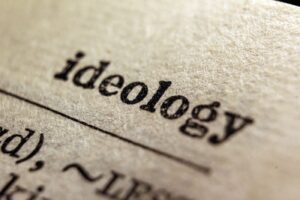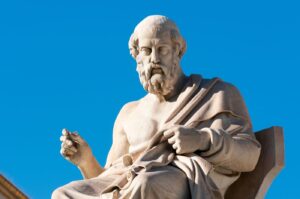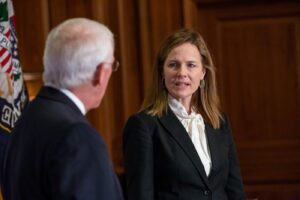The “marriage plot” of Jeffrey Eugenides’ novel The Marriage Plot is explained in an English class at Brown University in the early-1980s, the place and time of the story. Seventy-nine year-old Professor Saunders, a holdover from the days before deconstruction, French feminism, semiotics, and other abstruse theories arrived on campus, interprets the novel this way:
The novel had reached its apogee with the marriage plot and had never recovered from its disappearance. In the days when success in life had depended on marriage, and marriage had depended on money, novelists had had a subject to write about. The great epics sang of war, the novel of marriage. Sexual equality, good for women, had been bad for the novel. And divorce had undone it completely. What would it matter if Emma married if she could file for separation later? How would Isabel Archer’s marriage to Gilbert Osmond have been affected by the existence of a prenup? … [M]arriage didn’t mean much anymore, and neither did the novel.
In former times, the marriage plot began with a young man or woman coming into adulthood and facing a decision fraught with irreversibility. The right marriage meant blissful stability, the wrong one misery until death. The tension that would make readers keep reading was ready-made, the identification with characters easy. The plot moved through an obstacle course of parental resistance, mistaken infatuations, a past complication in a young man’s life, questions of property, rivals to the woman’s affections, and so forth, with lots of social observation by the author along the way until the final resolution of matrimony.
But it worked only as long as a romance had lifelong consequences. One kiss had to mean a decisive pledge or a gross misjudgment. A marriage contract involved transfers of land and money. Marriage itself lasted forever, and escaping a bad one brought lasting ignominy. Once marriage lost its binding character, it no longer served the novel as a significant plot, and without the marriage plot, the novel lost its basis.
The old plot serves as a clever counterpoint to the plot of this novel, which portrays an engaging trio of students on their way to adulthood—a bright but unbalanced biologist (Leonard) and a reasonably smart English major (Madeleine) who end up in a grueling year shacking up and eventually marrying before he runs away (perhaps to save her from his demons), plus a thoughtful religious studies youth (Mitchell) who wanders to India and Mother Teresa’s Home for Dying Destitutes while pining to marry Madeleine. When her marriage collapses and Mitchell and Madeleine unite at her parents’ home and become lovers, the next morning he changes his mind—“He looked at Madeleine. She wasn’t so special, maybe.” That’s the last page of the book. The previous 400 pages have chronicled scattered episodes during and after college, each one promising to transform them, such as Leonard’s fellowship year in a prestigious laboratory and Madeleine’s seminar in literary theory. None of them proves decisive, however, their impact lasting only until the next episode. At the end, Leonard has disappeared into Oregon, Madeleine is on her way to graduate school in English, and Mitchell has no idea where he’s heading, though he has dropped all plans to go to divinity school.
Start your day with Public Discourse
Sign up and get our daily essays sent straight to your inbox.These are college students circa 1982, not the sons and daughters of lords and wealthy British tradesmen in 1832. They live together before they get married, jump from partner to partner, drink to excess, and draw ideas and values not from God and country but from teachers and academic fashion and, most of all, from the social interests of one another. Mitchell is the exception, not only because of his devotion to Madeleine, but also because of his books (Augustine, Thomas á Kempis) and charity (though he labors in the Home for only a month before fleeing in shock, for which we shouldn’t judge him). His spiritual quests, however, influence him less than his love for Madeleine, and it hasn’t a speck of caritas in it. Take away the social and personal dimensions of their lives and the stories signify little else. Madeleine’s decision to marry Leonard suggests nothing about the meaning of marriage in general, and Mitchell’s religious explorations bear only upon his own circumstances, not on the conditions of faith in late-twentieth-century America. Eugenides inserts a lengthy section on Leonard’s tortuous descents into manic depression, with brief, vivid portrayals of self-serving parents and tactical medications. It’s a compelling presentation, but it has few moral, philosophical, or social implications, showing instead only the behavioral effects of chemical imbalance and unloving parents.
This is not to criticize Eugenides, but to underscore the plight of the post-marriage plot novelist. What do the motivations and dilemmas of these youths amount to? Everything to them, nothing to us. Eugenides produces a readable novel out of the ups and downs of early-1980s twenty-somethings, but they represent nothing more than themselves. Think of Gatsby presented as a guy still smitten with an old flame and trying to win her back, his ambition all his own, not a reflection, too, on broader human conditions (“so we beat on, boats against the current, borne back ceaselessly into the past”).
Indeed, the comparison to other characters illuminates the situation of literature in a world wholly liberalized and individualized. At the center of Pride and Prejudice is Elizabeth Bennet’s decision regarding marriage. Her judgment reflects not only upon herself, but upon every other young man and woman in a certain class in England at the time. Yes, the decision rests with her, but the meaning of it, the nature and circumstances of courtship and matrimony, belongs to her society, and hence the decision has a representative value that she cannot dispel. Her sharp wit never turns upon the institution itself, and, however willful she is, she accepts the conditions of it. Elizabeth’s case reflects an entire social machinery in action, while Madeleine’s marriage represents only her own choice.
Or, regarding Mitchell’s religious queries, consider Ivan Karamazov. They pose some of the same questions about suffering and Christ, and both of them fail to land upon faith. Neither of them experiences God, but while Ivan’s answers lead him into despair and madness, Mitchell’s answers (or rather, his inability to experience God’s grace) lead him to shrug off the whole religious thing and pursue a future elsewhere. Ivan’s crisis is a touchstone of modernity, Mitchell’s an excursion in the bio of a college grad.
Finally, set Leonard alongside Quentin Compson of Faulkner’s The Sound and the Fury. Their pathologies differ, but we may still compare their framing as representations. Leonard sometimes slips into mania—not sleeping, phoning friends incessantly, romancing one girl after another—and sometimes slides into anomie—avoiding work, thinking about getting old, gaining weight. Eugenides probes his upbringing and details treatment he receives in the hospital and from psychiatrists, but the background doesn’t prompt general observations on modern families, and his medical experiences don’t allow for reflections on the understanding and care of psychic turmoil circa 1980. Quentin’s situation is different. As he proceeds through the day that will end with his suicide, Quentin ponders two things over and over: his sister’s sexuality and his father’s tutelage. They follow him every waking moment, his sister’s lovers plaguing his male identity and his father’s remembered commentary rising into musings on the human condition (for instance, handing his son a watch with the words: “I give you the mausoleum of all hope and desire . . . I give it to you not that you may remember time, but that you might forget it now and then for a moment and not spend all of your breath trying to conquer it”). Virginity becomes not just a scourge for Quentin, but an issue to consider in itself, and his father’s enfeebling despair acquires a value independent of how it affects Quentin. Leonard’s experience is all Leonard’s and will remain so for readers. Quentin’s experience has become the experience of countless readers as well, for instance, that of the French existentialists who made an idol of Faulkner in the 1940s.
Again, we should not fault the novelist because his characters don’t signify anything more than themselves. We live in the postmodern condition, when “meta-narratives,” as Jean-Francois Lyotard called them, have collapsed, those obsolete structures including the marriage plot, the bildungsroman, the salvation story, and other archetypal plots based on now-exploded notions of being and humanity. Eugenides himself highlights the problem in the beginning, that is, the loss of the marriage plot, which we may extend to the inability of any individual to mean anything more than himself once social (or political, religious, intellectual, etc.) institutions collapse. When individualism triumphs, when romance and marriage are entirely an individual thing, the drama of the characters narrows accordingly, and social, religious, political, and other obligations are recast as impositions.
We find its expression in the now-famous assertion in Planned Parenthood v. Casey (1992):
At the heart of liberty is the right to define one’s own concept of existence, of meaning, of the universe, and of the mystery of human life.
Apart from the truth or politics of that statement, its consequences for the novel are certain. A good plot needs conflict, an unsettled situation whose outcome we care about. For more than two centuries, the theme of “individual vs. society” provided a ready tension for it, as in Huck Finn’s personal feelings for Jim clashing with the norms of slave society, or Edna in Kate Chopin’s The Awakening rebelling against patriarchal demands in turn-of-the-century Louisiana. The conflict worked precisely because the social side isn’t powerless and on occasion voices a legitimate criticism of the specific individual with whom we sympathize. Once all legitimacy lies on the individual side, once social institutions have no claim upon the one, tension dissipates and the novel reads like a chronicle of events in the life of _____, not a meaningful examination of human affairs in this or that setting.
This is the position of The Marriage Plot. The one area in which the novel does evoke larger concerns that did affect American culture during those years—or at least an important enclave of it, the college campus—only proves the decline of those concerns into a strictly individualist import. As Madeleine proceeds in her English major, she takes a seminar in semiotics, where she gains from Barthes’ A Lover’s Discourse not insights about humanity at large but rather resonance with her own experiences. Of the book, she first observes that “the writing seemed beautiful,” and then Barthes’ sentences crystallize into an insight: “Here was an articulation of what she had been so far mutely feeling . . . Madeleine was in a state of extreme solitude.”
The insight ends the paragraph on that expanding clarity, but the very next sentence shrinks it back to the peer scene: “It had to do with Leonard. With how she felt about him and how she couldn’t tell anyone.” The moment fails. A Lover’s Discourse doesn’t draw her out of her paltry individual existence, but instead reinforces it. She continues with Barthes obsessively for weeks, but “She was reading A Lover’s Discourse and marveling at its relevance to her life.”
Precisely. Once social institutions deteriorate and people live contained by their own sole selves, relevance becomes the first measure of value. Barthes appeals to her not because he imparts truths about life or expresses well a plight many of us share, but because he voices her state of mind and feeling, locally and immediately. He prompts a broader understanding of love—“It explained what love was like and, just maybe, what was wrong with it”—but only for a second before she returns the text to her personal circumstances. It’s the dilemma of the narcissist, and of the postmodern novelist. The dominant venues of our culture empower the personal perspective, a do-whatever-you-want-as-long-as-you-don’t-infringe-on-others outlook, and the contemporary novelist interested in current conditions represents sensibilities that result from it. But the more those characters care about themselves and circle events, ideas, places, books, and everything else back into the sphere of their direct experiences, the less we care about them.










